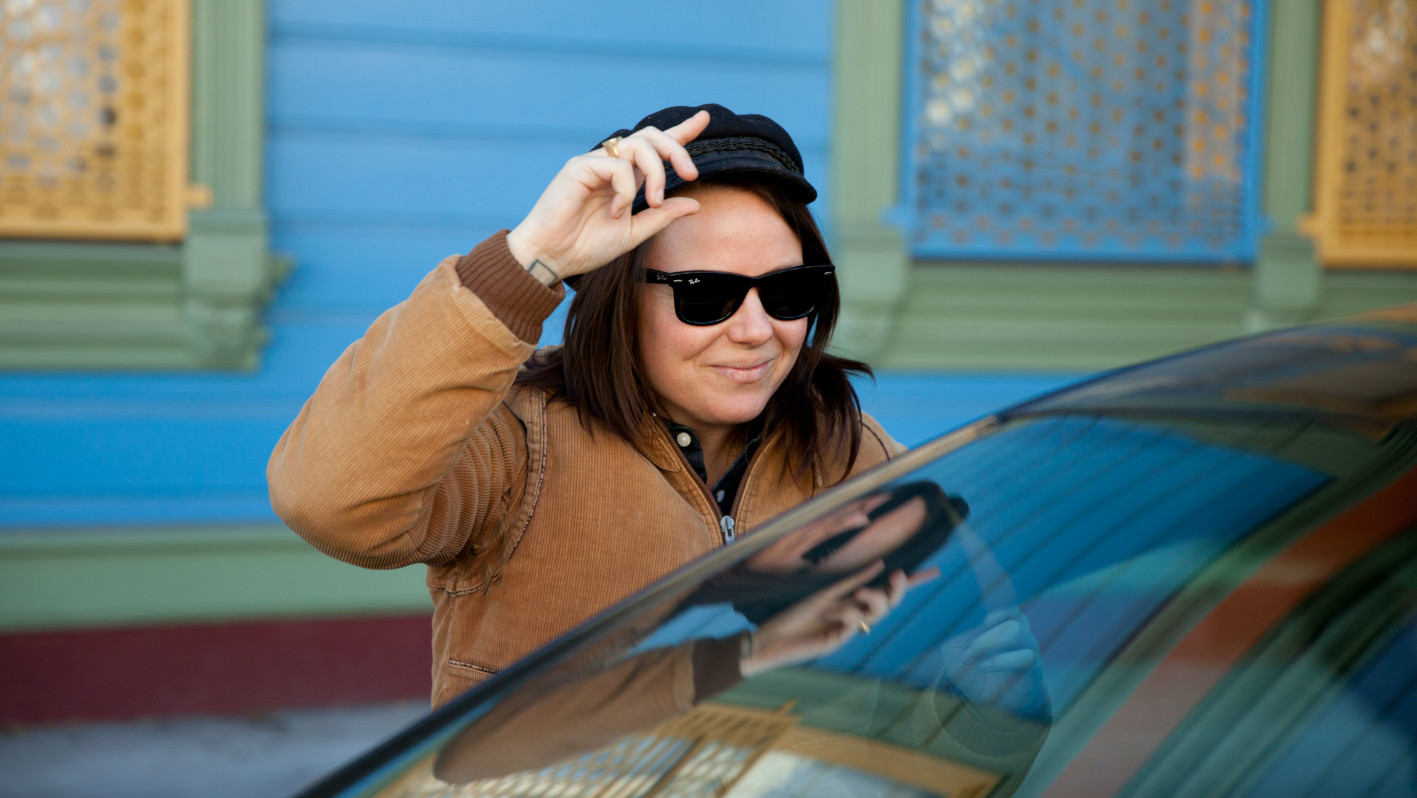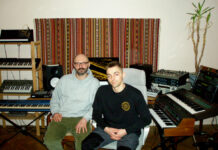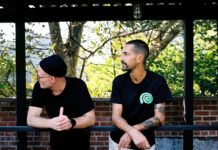Photo: Lydia Daniller (Doc Sleep)
Doc Sleep is a team player. Whether as a resident of Berlin’s Room 4 Resistance parties or as a co-owner of the transatlantic Jacktone label, the Berlin-based US American is involved in several overlapping communities which foster the bonds within the underground. As a solo producer, she has this far kept a low profile, however seems to step up in 2019: After the release of the digital EP Your Ruling Planet, her next release will come out on Dark Entries and features remixes by Naive founder Violet and rRoxymore. The latter’s rework can also be heard on her contribution to our Groove podcast, a mix that oin true Doc Sleep seamlessly integrates material from very different backgrounds.
You grew up in North Dakota amongst a musical family. How did you get into electronic music and dance music in particular?
I first heard dance music at a monthly queer party called Decadance, thrown in the back room of a bowling alley in Fargo. Armand Van Helden and Nine Inch Nails are particular memories, also synth and new wave – Depeche Mode, Adam Ant. It was very wholesome. There was also a farm outside Fargo known for hosting events in a barn – country line dancing one night, classic rock cover bands another night, and sometimes… a rave. We heard about one of the raves, hopped in the car and arrived to find this secret and thriving alien culture – it blew my mind. On weekends, we would drive to Minneapolis and hit up the gay clubs and record shops. I discovered the DJ Kicks and Global Underground mix series at this point, and they were very transformative for me. I particularly loved the Andrea Parker DJ-Kicks and Danny Tenaglia GU’s.
Your latest EP Your Ruling Planet was produced in January 2019 and released in March, which makes it seem as if it was a rather spontaneous record. How did it come together?
It actually wasn’t so spontaneous, more like way overdue. (laughs) I wasn’t able to produce much in 2018, so by the end of the year I finally made the decision to prioritize and focus on production. I had themes in mind and an overall feel I wanted to convey, but wasn’t sure what it would look like when it was finished. I’m happy with it and it also felt important to finally make my own musical contribution to the label alongside our awesome artists.
The five tracks make use of fields recordings. You said to CDM’s Peter Kirn that you were “trying to recreate and reconstruct situations / memories that represent something meaningful for (you) personally.” That seems like a very specific aim for doing field recordings. How did you try to achieve it and where did you record the sounds?
For this EP, on one hand I had a very specific intent for myself with very specific types of environmental sounds I wanted to use. On the other hand, I was also trying to tap into more universal feelings of nostalgia using recognizable everyday ambiance/sounds to draw folks in, and prompt recall and familiarity. I enjoy the online search and discovery for field recordings these days – freesound.org is an amazing database for things like this.
You co-run the label Jacktone, which releases primarily records by Bay Area or West Coast producers. Stylistically speaking, Jacktone is very diverse. What is important to you in terms of programming the label?
We knew we wanted to release electronic music, but instead of focusing on a single genre, or just dance music, we decided to explore the many gradations within it. We’re lucky to have been part of an active community of producers in the Bay and the label helps keeps us connected now that we no longer live there. Often, we release artists who not only know each other, but they’re also friends and frequently collaborating. People are making wildly different types of electronic music in the Bay, but they still bounce tracks off one another. As the label has grown, our core roster is still in the Bay, but we release producers from many different places, which has also helped shape and diversify the sound. There isn’t one single formula to the curation – it has to resonate with us and be interesting. Does it have the artist’s own personal stamp on it? Is the music them – for lack of a better way to describe it at the moment.
Besides vinyl and CDs, Jacktone also releases a lot of records on tape – a medium that has seen somewhat of a resurgence in recent years. Which advantages do tapes have from a label perspective?
Adding tapes into the mix has allowed us to showcase artists making interesting music that represent our more broad music tastes. Tapes also provide – relatively – immediate representation of an artist’s sound, which is vital. We also take a lot of care regarding the aesthetics of the tapes, and try to turn them into nicely-designed art pieces for the artist to sell at shows, bring to their local record shops, show their mom, etc.
What was the idea behind your contribution to our Groove podcast?
I wanted to include as many friends’ projects as I could – Jacktone artists releasing on other friends’ labels, for example – and create a mood, rather than just straight slammers. I went for dubbed out, melodic and off-kilter at the start, progressed to upfront jams and ended with some emo acid.
Last but not least: Where can we see you behind the decks in the near future and what are your plans as producer and label owner?
I’m headed to the states the last weeks of March for gigs in Knoxville, NYC, DC and Philly, then back to Berlin for Cocktail D’Amore at Griessmuehle April 7th. Room 4 Resistance is throwing its first concert with Teto Preto on April 18th at Trauma Bar and I’m playing Globus/Tresor April 22nd and then I’m off to San Francisco to take part in the 2nd edition of Mutek. Production-wise, I have an EP on Dark Entries later this Spring, tracks on two upcoming comps and then I need to buckle down and record a few more EPs and a lot more mixes. The label schedule is busy again this year. In the next few months we’re releasing an experimental “sonic Dada” full-length from Tennessee-based Le Scrambled Debutante; a series of singles from returning Bay Area talent, Roche; a beautifully-moody debut full-length from our friend, juneunit; and, a third album from Hugo Paris (formerly, Lavender) which is also our first collaborative label project of the year – with Beacon Sound in Portland, Oregon.
Stream: Doc Sleep – Groove Podcast 203
01. Lara Sarkissian – Tell Me, Where do the Butterflies Live (Club Chai)
02. Bergsonist – Birthdeath (bergsonist.bandcamp.com)
03. Kilchhofer – Varen (Marionette)
04. Kaap – Bodycode (Yield)
05. Rex Kirby Meets Becky D. at Studio Geordie! – Only U (Boomarm Nation)
06. Al Wootton – Selah (Trule)
07. gayphextwin – bleached (gayphextwin.bandcamp.com)
08. Radioactive Man – Bonnet Bee (Asking for Trouble)
09. Doc Sleep – Crème fraîche (rRoxymore Remix) (Dark Entries)
10. Demongay – Cock Lust (demongay.bandcamp.com)
11. Photonz – Hospital Acid (Dark Entries)
12. Saint Thomas LeDoux – Sinus Pressure (Junted)
13. The Operator – Hostile Applets (Djax-Up-Beats)
14. Alex Falk – UPP (International Black)
15. Grey People – You’re Hilarious (Nerang)
16. Ectomorph – Silver (Interdimensional Transmissions)
17. Vidiian – Frustrating Acid (Run the Length of Your Wildness)





